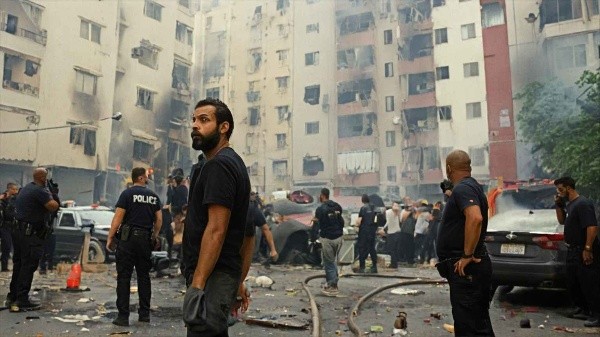Iran’s Plan to Strike Back Against the U.S.
Iran’s Military Preparations Following U.S. Attacks
Loading...

Israeli army says it kills top Hezbollah commander Ibrahim Aqil, but the Lebanese group has yet to confirm his death.
Deadly Airstrike in Beirut
On Friday, September 20, 2024, an Israeli airstrike on a southern suburb of Beirut resulted in the deaths of at least 12 individuals, including five children, and left 66 others injured. The attack targeted a residential area on Jamous Street, where an F-35 jet executed two strikes, devastating a high-rise building during rush hour as families were returning home from work and school. Local news outlets reported scenes of destruction, with first responders searching through the rubble of collapsed apartment buildings for survivors.
Targeting Hezbollah Leadership
The Israeli military claimed that the airstrike was a “targeted strike” aimed at high-ranking members of Hezbollah, specifically identifying the operation as having killed Ibrahim Aqil, a prominent commander within the group. However, Hezbollah has yet to confirm his death. Aqil is notably linked to a $7 million bounty placed on him by the United States due to his alleged involvement in the 1983 bombing of a U.S. Marines barracks in Lebanon.
This incident marks the second time in less than two months that Israel has targeted a leading Hezbollah commander in Beirut, following the killing of Fuad Shukr, the group's top military leader, in July.
Reactions from Lebanese Officials
Lebanese Prime Minister Najib Mikati condemned the airstrike, stating that it demonstrates Israel's disregard for human rights and moral considerations. In contrast, Israeli Prime Minister Benjamin Netanyahu asserted that Israel's objectives are clear, emphasizing that the military actions are a necessary response to ongoing threats.
Israeli Defense Minister Yoav Gallant indicated that the country is entering a new phase of conflict along the northern border, stating that operations will continue until the safety of northern residents is ensured.
Ongoing Cross-Border Tensions
The airstrike occurred amidst escalating tensions along the Lebanon-Israel border, where Hezbollah has been engaged in near-daily exchanges of fire with Israeli forces, largely in support of Palestinians in Gaza. Earlier on the same day, Hezbollah launched approximately 170 rockets into northern Israel, a retaliation for Israeli attacks that had targeted southern Lebanese villages.
Rami Khoury, a professor at the American University of Beirut, described Israel's actions as a “rampage”, fueled by unwavering U.S. support. He suggested that while an escalation in conflict seems inevitable, an all-out regional war is not imminent. Khoury noted that Israel has historically struggled to defeat Hezbollah, which is better equipped than Hamas and has strong ties to Iran.
Israeli Military Response
In response to the rocket fire, the Israeli military reported that its air defenses intercepted several incoming rockets, while others fell in open areas, causing no injuries. The military had previously targeted rocket launchers in southern Lebanon, preparing for potential retaliatory strikes.
As tensions continue to rise, the Israeli government has issued warnings to its citizens, advising them to remain near bomb shelters as the situation remains volatile.
The ongoing conflict highlights the fragile state of security in the region, with both sides engaging in a cycle of retaliation that raises concerns about further escalation and civilian casualties.
Editor
Iran’s Military Preparations Following U.S. Attacks
Troops remain in five strategic locations, raising fears of renewed tensions and long-term occupation.
Opposition forces have taken control of the capital after a significant offensive. Here is how it unravelled.
